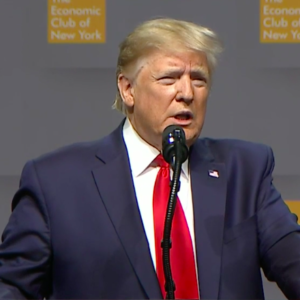I won the in-law lottery. My mother-in-law is a gracious and sophisticated woman — well-traveled, well-educated, the author of several books on local history.
She is the kind of person who wouldn’t give the alternate reality of Trump World a second look.
Except she did. In fact, she fell for it hook, line and sinker. She voted for Donald Trump twice and still believes today that his re-election victory was stolen by a vast and hidden Deep State conspiracy.
Her blind loyalty to Trump, and intolerance for other points of view, has caused concern, anguish and, ultimately, alienation throughout my wife’s extended family. The inauguration of Joe Biden, with its theme of unity, has not eased her bitterness.
I’m sure many readers have their own stories of families being sundered by irreconcilable differences over Trump. You probably have found, as has my wife’s family, that reasoning with a committed Trump supporter is futile.
For the record, let’s just remind ourselves that the top Trump administration election official called the 2020 election “the most secure in American history, ” and that more than 60 courts, including the U. S. Supreme Court, ruled against election challenges from Trump and his allies.
No person could rationally believe that thousands of Republican and Democratic election officials across the land, and scores of judges, again from both parties, could work together in absolute secrecy to falsify the results of the presidential election, and all the time without revealing the least evidence of their nefarious conspiracy.
And yet, millions still do.
The “stolen” Trump election, with its incitement of insurrection, joins other dangerous lies that unscrupulous leaders throughout history have fed their followers for their own purposes. These include the blood libels against Jews that inspired the Nazis or the fever dreams spread by radio broadcasts that led Hutus to slaughter Tutsis in the Rwanda genocide of 1994.
Why do reasonable people fall for this?
The biggest factor, studies show, is sustained immersion in the sea of fake news, and exclusion from other viewpoints – whether voluntarily, i.e. choosing to live in an “echo chamber, ” or involuntarily due to government control of the media, as in Nazi Germany and Rwanda.
No matter how rational we think we are, when we only hear a single perspective time after time we start to internalize and accept it.
The truth can’t make you free if you can’t hear it.
A contributing factor is what psychologists call “confirmation bias” – we tend to focus on news that confirms what we already believe.
For example, an anti-vaxxer can probably remember vividly articles about children who developed health problems after being vaccinated, even if there was no evidence of a causal link. But the countless reports of large-scale studies by independent researchers supporting vaccine effectiveness? Not so much.
In addition, research shows that we are more willing to believe propaganda when the person delivering it is someone we already trust. (“Trump wouldn’t lie to me.”) Similarly, if a contrary point of view would cause us discomfort we are prone to deny it against all evidence.
Psychologists confirm what experience tell us, that scorning or arguing with someone who has fallen into the rabbit hole of fake news only deepens their convictions. After all, as Nazi information minister Joseph Goebbels said, “Propaganda works best when those who are being manipulated are confident they are acting on their own free will.”
The best way to bring around a fake news believer who is close to you is to expose them to true information sources, to ease their way into at accepting a reality that may be uncomfortable, and to do so with patience and compassion.
That what my wife’s family is trying with her mom. It’s slow going, but we are hopeful that as Trump’s visibility fades she will start to re-open her world to different voices – including the three generations who want their matriarch back.

